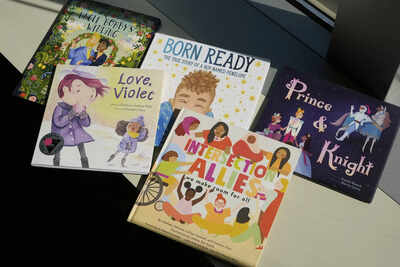
FILE - A selection of books featuring LGBTQ characters that are part of a Supreme Court case are pictured, April, 15, 2025, in Washington. (AP Photo/Pablo Martinez Monsivais, File)
A subtle but transformative shift is underway in American classrooms. In June 2025, the Supreme Court ruled that public school students in Maryland could be withdrawn from lessons involving LGBTQ+ themed books based on religious objections.
The decision, cloaked in the language of liberty, has opened the door to a vast reimagining of what public education is, and who it is for.Far from being a narrow ruling on curriculum content, the case has become a symbol of a growing movement that redefines public schooling not as a shared civic space but as a battleground of individualized belief systems. The precedent set does not just allow dissent from materials; it begins to unravel the idea of education as a collective societal contract.
A curriculum unbound
Traditionally, public education has been structured around the notion of common learning: A set of core subjects and shared narratives designed to prepare children for civic life in a pluralistic society. That ideal now stands on fragile ground.With the recognition of the right to opt out based on personal beliefs, the school curriculum becomes a fragmented landscape, increasingly shaped by competing ideologies rather than educational coherence.
No longer does the school system offer a single, structured framework of knowledge; it offers multiple, often conflicting, pathways that mirror household convictions.This emerging model challenges the very nature of public education. If subjects can be dismissed on the grounds of religious or cultural discomfort, then the definition of a public school begins to blur, drifting toward a privatized experience within a public shell.
The administrative spiral
This shift imposes a staggering logistical burden on schools. As more families request exemptions from various topics, school districts must design parallel lessons, monitor attendance at specific readings, and navigate the political risks of perceived bias. In doing so, educators are placed in an untenable position: Deliver inclusive instruction while simultaneously upholding the right to exclusion.The result is not flexibility, it is fracture.
Teachers are left without a consistent foundation to build on, students receive uneven exposure to social realities, and classrooms evolve into ideological echo chambers. Rather than spaces of dialogue and exploration, they risk becoming zones of withdrawal and filtered truths.
The disintegration of pluralism
Education is not simply the transfer of information; it is the shaping of civic understanding. When students are insulated from perspectives they do not already hold, they are deprived of essential opportunities to develop critical thinking, empathy, and the ability to engage with difference.
These are not optional virtues in a democracy, they are its backbone.The shift toward opt-out education corrodes this foundation. It prioritizes comfort over complexity, personal conviction over public good. Over time, such a model produces citizens who are less equipped to navigate social diversity, negotiate disagreement, or engage constructively with the broader world. What was once a crucible for shared values is becoming a canvas of curated beliefs.
Toward a patchwork nation
The long-term consequence is a kind of educational secession. Communities will increasingly define their public schooling by what they choose to exclude. While one district removes LGBTQ+ materials, another might sidestep racial history, while yet another evades science or global affairs. The notion of a nationally recognizable education weakens, replaced by a quilt of selectively filtered truths.This decentralization of curriculum might appear democratic, but it undermines the very function of a public system.
When every community redraws the boundaries of what can be taught, the next generation inherits not a common culture but a disjointed series of moral geographies.
The fragility of the public sphere
The tension between individual rights and collective learning is not new. But what is new is the speed at which individualism is displacing public purpose in educational discourse. This case marks a turning point, where the assertion of personal belief has begun to override the responsibility of schools to offer a comprehensive, reality-reflective education.The choice facing public education today is not between inclusion and exclusion. It is between cohesion and fragmentation. If classrooms continue to splinter along ideological lines, the next generation may inherit not only a divided society, but also the educational scaffolding to keep it that way.
A future in question
As opt-outs expand, the core identity of public schooling enters uncharted territory. What remains of the civic mission when shared knowledge becomes optional? What happens to a republic when its youngest citizens are raised not on dialogue, but on divergence?
At stake is more than a debate over books or lessons. It is the essence of public life. Education is one of the last remaining institutions where society comes together. To hollow it out from within—one opt-out at a time—is to quietly dismantle the promise of a democratic, pluralistic future.

 5 hours ago
34
5 hours ago
34




























 English (US)
English (US)